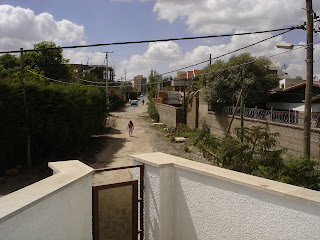Internet connenction
Leider betrifft das nicht nur genannte Staaten und Gebiete sondern auch Ostafrika!
Internetverbindung ist sehr langsam! Ich habe mir vor kurzem noch Gedanken darüber gemacht, wie die Verwendung des Internetz die Arbeitsweise der Menschen und auch deren Kommunikation beeinflußt. Durchforstet man etwas das Angebot im Netz wird man schnell erkennen dass sich viele Anwendungen sozusagen ins Netz verlegt haben. Ob das jetzt Office Anwendungen, Soziale Netze, oder purer Informationsaustausch ist. Die Abhängigkeit der Arbeitswelt aber auch der Gesellschaft im privaten Bereich ist sehr groß geworden.
Wie ich die Vielfalt der Anwendungsmöglichkeiten des sogenannten web2.0 erkundet habe, ist mir vorallem ein Gedanke gekommen, neben der Privatssphären Diskussion rund um den transparenten Menschen im Internet, was ist, wenn das Internet ausfällt? Keine oder beschränkte Kommunikation, massive Impacts auf die Arbeitswelt und Ökonomie von betroffenen Regionen. Wie ich weiter überlegt habe ist mir Strom in den Sinn gekommen. Wie selbstverständlich eigentlich eine ununterbrochene Stromversorgung für uns heutzutage geworden ist. Niemand würde auch nur einen Gedanken daran verschwenden, eine Gerät (Spitäler, jede Art von Arbeitsgerät) nicht zu verwenden weil evt. der Strom ausfallen könnte und wir abhängig davon sind. Mit dem Internet wird es ähnlich sein. Viele Anwendungen des täglichen Lebens werden sich ins Netz verlagern und zwangsläufig davon abhängig werden. Möglicherweise werden wir in einigen Jahre oder die nächste Generation auch keinen Gedanken mehr darüber verschwenden ob die Internetversorgungssicherheit gewährleistet ist. Abgesehen von alle Diskussion rund um die Privatsspäre der Menschen, wird die Abhängigkeit von Technologien größer. Auch die Verwundbarkeit?
Oder wird in einigen Jahren niemand mehr über diese Dinge nachdenken weil sie so selbstverständlich geworden sind und Teil unserer Geselleschaft und Kultur?
Artikel:
Kabelriss
Ägypten und Indien offline
Weite Teile Indiens, Ägyptens und einige arabische Staaten waren am Mittwoch vom Internet abgeschnitten. Zwei gerissene Unterseekabel vor der ägyptischen Nordküste soll das Blackout im Netz verursacht haben. Laut ägyptischen Behörden sind rund 70 Prozent des Internet-Netzwerks im Land ausgefallen. In Indien war die Bandbreite um rund die Hälfte reduziert. Der Offline-Status führte auch zu Chaosszenen auf der Kairoer Börse. Die Aktienhändler beklagten, dass sie gar nicht oder nur "blind" handeln konnten. Auch zahlreiche riesige Call-Center mussten wegen des Internet-Ausfalls ihre Arbeit einstellen.
Techniker der betroffenen Länder haben mittlerweile eine Mindestversorgung der Kabelnetze sichergestellt, es kann aber bis zu zwei Wochen dauern, bis das Internet wieder in vollem Umfang nutzbar ist.
Quelle
lg
Dom!n!K



